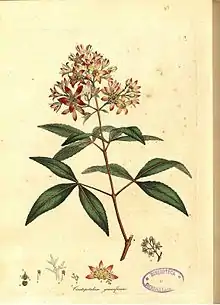Ceratopetalum
Ceratopetalum is a genus of nine species of shrub and tree in the family Cunoniaceae. They are found along the eastern coast of Australia and extend north to New Guinea. Two Australian species are among the best known, one being C. apetalum or coachwood, renowned as a timber tree, and C. gummiferum, the New South Wales Christmas bush.
| Ceratopetalum | |
|---|---|
.jpg.webp) | |
| C. gummiferum in flower | |
| Scientific classification | |
| Kingdom: | Plantae |
| Clade: | Tracheophytes |
| Clade: | Angiosperms |
| Clade: | Eudicots |
| Clade: | Rosids |
| Order: | Oxalidales |
| Family: | Cunoniaceae |
| Genus: | Ceratopetalum D. Don[1] |
| Species | |
|
See text | |
A cladistic analysis of morphology shows that the NSW Christmas bush (C. gummiferum) and coachwood (C. apetalum) are the oldest two offshoots from the lineage that gave rise to the rest of the genus. These species are found in rainforest of southeastern Australia east of the Great Dividing Range.[2]
Species
- Ceratopetalum apetalum D.Don (Coachwood)
- Ceratopetalum corymbosum C.T.White
- Ceratopetalum gummiferum Sm. (NSW Christmas bush)
- Ceratopetalum hylandii Rozefelds & R.W.Barnes
- Ceratopetalum iugumensis Rozefelds & R.W.Barnes
- Ceratopetalum macrophyllum Hoogland
- Ceratopetalum succirubrum C.T.White
- Ceratopetalum tetrapterum Mattf.
- Ceratopetalum virchowii F.Muell.
Fossil evidence
Fossil evidence for Ceratopetalum species has been found in Eocene deposits in South Australia.[3] Named fossil species include Ceratopetalum maslinensis and Ceratopetalum westermannii.
References
- "Ceratopetalum Sm". Australian Plant Name Index (APNI), IBIS database. Centre for Plant Biodiversity Research, Australian Government.
- Rozefelds, Andrew C.; Barnes, Richard W. (2002). "The Systematic and Biogeographical Relationships of Ceratopetalum (Cunoniaceae) in Australia and New Guinea". International Journal of Plant Sciences. 163 (4): 651–673. doi:10.1086/339716.
- Barnes RW, Hill RS.Ceratopetalum fruits from Australian cainozoic sediments and their significance for petal evolution in the genus. Australian Systematic Botany 12(5) 635 - 645.
